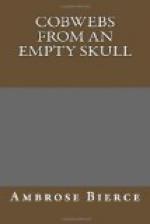“I detect no flaw in your abstract of title,” replied the dog; “all seems quite regular; but I must not provoke a breach of the peace by lightly relinquishing what I might feel it my duty to resume by violence. I must have time to consider; and in the meantime I will dine.”
Thereupon he leisurely consumed the property in dispute, shut his eyes, yawned, turned upon his back, thrust out his legs divergently, and died.
For the meat had been carefully poisoned—a fact of which the raven was guiltily conscious.
There are several things mightier than brute force, and arsenic[A] is one of them.
[Footnote A: In the original, “pizen;" which might, perhaps, with equal propriety have been rendered by “caper sauce.”—TRANSLATOR.]
LXXI.
The King of Persia had a favourite hawk. One day his Majesty was hunting, and had become separated from his attendants. Feeling thirsty, he sought a stream of water trickling from a rock; took a cup, and pouring some liquor into it from his pocket-flask, filled it up with water, and raised it to his lips. The hawk, who had been all this time hovering about, swooped down, screaming “No, you don’t!” and upset the cup with his wing.
“I know what is the matter,” said the King: “there is a dead serpent in the fountain above, and this faithful bird has saved my life by not permitting me to drink the juice. I must reward him in the regular way.”
So he called a page, who had thoughtfully presented himself, and gave directions to have the Remorse Apartments of the palace put in order, and for the court tailor to prepare an evening suit of sackcloth-and-ashes. Then summoning the hawk, he seized and dashed him to the ground, killing him very dead. Rejoining his retinue, he dispatched an officer to remove the body of the serpent from the fountain, lest somebody else should get poisoned. There wasn’t any serpent—the water was remarkable for its wholesome purity!
Then the King, cheated of his remorse, was sorry he had slain the bird; he said it was a needless waste of power to kill a bird who merely deserved killing. It never occurred to the King that the hawk’s touching solicitude was with reference to the contents of the royal flask.
Fabula ostendit that a “twice-told tale” needs not necessarily be “tedious”; a reasonable degree of interest may be obtained by intelligently varying the details.
LXXII.
A herd of cows, blown off the summit of the Himalayas, were sailing some miles above the valleys, when one said to another:
“Got anything to say about this?”
“Not much,” was the answer. “It’s airy.”
“I wasn’t thinking of that,” continued the first; “I am troubled about our course. If we could leave the Pleiades a little more to the right, striking a middle course between Booetes and the ecliptic, we should find it all plain sailing as far as the solstitial colure. But once we get into the Zodiac upon our present bearing, we are certain to meet with shipwreck before reaching our aphelion.”




